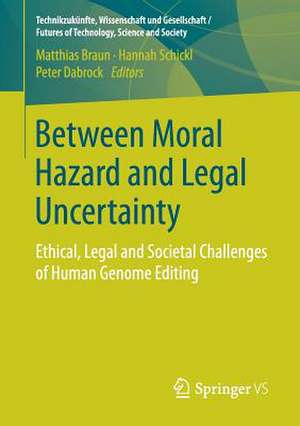Between Moral Hazard and Legal Uncertainty: Ethical, Legal and Societal Challenges of Human Genome Editing: Technikzukünfte, Wissenschaft und Gesellschaft / Futures of Technology, Science and Society
Editat de Matthias Braun, Hannah Schickl, Peter Dabrocken Limba Engleză Paperback – 21 noi 2018
Din seria Technikzukünfte, Wissenschaft und Gesellschaft / Futures of Technology, Science and Society
-
 Preț: 361.65 lei
Preț: 361.65 lei - 13%
 Preț: 391.37 lei
Preț: 391.37 lei -
 Preț: 347.04 lei
Preț: 347.04 lei -
 Preț: 442.83 lei
Preț: 442.83 lei - 15%
 Preț: 502.54 lei
Preț: 502.54 lei -
 Preț: 349.74 lei
Preț: 349.74 lei -
 Preț: 385.84 lei
Preț: 385.84 lei -
 Preț: 480.83 lei
Preț: 480.83 lei -
 Preț: 492.20 lei
Preț: 492.20 lei -
 Preț: 424.43 lei
Preț: 424.43 lei -
 Preț: 459.92 lei
Preț: 459.92 lei -
 Preț: 486.60 lei
Preț: 486.60 lei -
 Preț: 453.01 lei
Preț: 453.01 lei -
 Preț: 349.74 lei
Preț: 349.74 lei -
 Preț: 422.70 lei
Preț: 422.70 lei -
 Preț: 447.62 lei
Preț: 447.62 lei - 15%
 Preț: 469.41 lei
Preț: 469.41 lei
Preț: 448.97 lei
Nou
Puncte Express: 673
Preț estimativ în valută:
85.91€ • 89.95$ • 71.26£
85.91€ • 89.95$ • 71.26£
Carte tipărită la comandă
Livrare economică 09-23 aprilie
Preluare comenzi: 021 569.72.76
Specificații
ISBN-13: 9783658226596
ISBN-10: 3658226595
Pagini: 218
Ilustrații: IX, 225 p. 1 illus.
Dimensiuni: 148 x 210 x 11 mm
Greutate: 0.29 kg
Ediția:1st ed. 2018
Editura: Springer Fachmedien Wiesbaden
Colecția Springer VS
Seria Technikzukünfte, Wissenschaft und Gesellschaft / Futures of Technology, Science and Society
Locul publicării:Wiesbaden, Germany
ISBN-10: 3658226595
Pagini: 218
Ilustrații: IX, 225 p. 1 illus.
Dimensiuni: 148 x 210 x 11 mm
Greutate: 0.29 kg
Ediția:1st ed. 2018
Editura: Springer Fachmedien Wiesbaden
Colecția Springer VS
Seria Technikzukünfte, Wissenschaft und Gesellschaft / Futures of Technology, Science and Society
Locul publicării:Wiesbaden, Germany
Cuprins
Mapping the Current Legal Framing.- Theoretical Challenges.- Orientation Markers for a Governance Frame in Dealing with Genome Editing.
Notă biografică
Matthias Braun is assistant Professor at the Chair of Systematic Theology II (Ethics), Friedrich-Alexander University Erlangen-Nuremberg.
Hannah Schickl is research assistant in the Interdisciplinary Research Group “Gene Technology Report”, Berlin-Brandenburg Academy of Sciences and Humanities.
Peter Dabrock is Professor of Systematic Theology/Ethics at the Friedrich-Alexander University Erlangen-Nuremberg and Chair of the German Ethics Council.
Textul de pe ultima copertă
Genome Editing Techniques are seen to be at the frontier of current research in the field of emerging biotechnologies. The latest revolutionary development, the so-called CRISPR technology, represents a paradigmatic example of the ambiguity of such techniques and has resulted in an international interdisciplinary debate on whether or not it is necessary to ban the application of this technique by means of a moratorium on its use for human germline modifications, particularly in human embryos in the reproduction process. However, given that other germline engineering techniques like mitochondrial (mt) DNA transfer techniques are already permitted and applied, the question arises what lies at the root of the apparent social unease about the modification of the human germline by Genome Editing Techniques like CRISPR. Against this background, the book seeks to make a substantial contribution to the current debate about a responsible and participatory framework for research on emergingbiotechnologies by analysing underlying perceptions, attitudes, arguments and the reasoning on Genome Editing Techniques.
Contents
- Mapping the current legal framing
- Theoretical Challenges
- Orientation markers for a Governance Frame in dealing with Genome Editing
Target Groups
Scientist, Policy Makers, Lecturers and students in the fields of Ethics, Philosophy, Theology, Law, Social and Political Science.
The Editors
Matthias Braun is assistant Professor at the Chair of Systematic Theology II (Ethics), Friedrich-Alexander University Erlangen-Nuremberg.
Hannah Schickl is research assistant in the Interdisciplinary Research Group “Gene Technology Report”, Berlin-Brandenburg Academy of Sciences and Humanities.
Peter Dabrock is Professor of Systematic Theology/Ethics at the Friedrich-Alexander University Erlangen-Nuremberg and Chair of the German Ethics Council.
Caracteristici
Current moral, legal and political questions about genetic engineering An interdisciplinary approach Answers to urgent questions about biotechnological development
